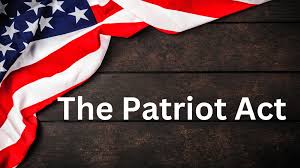In the wake of the devastating September 11, 2001 attacks, the U.S. Congress swiftly enacted the USA PATRIOT Act—short for Uniting and Strengthening America by Providing Appropriate Tools Required to Intercept and Obstruct Terrorism Act of 2001. Signed into law by President George W. Bush in October 2001, aimed to bolster the nation’s defense against terrorism, especially through financial surveillance and enforcement.
Purpose and Scope: Beyond Terrorism
Although widely recognized for expanding surveillance and intelligence authority, AML Watcher emphasizes that the Patriot Act played a seminal role in reshaping the U.S. anti-money laundering (AML) and counter-terrorism financing (CFT) framework:
- Strengthening AML and CFT capabilities: It reinforced the Bank Secrecy Act (BSA), criminalized terrorist funding, and broadened the definition of “financial institution.”
- High-risk jurisdiction scrutiny: Foreign jurisdictions and correspondent banking relationships needed heightened attention.
- Mandatory AML compliance: Institutions were required to implement internal programs, conduct customer screening, and submit Suspicious Activity Reports (SARs).
- Corporate and PEP transparency: Banks needed enhanced due diligence for politically exposed persons (PEPs), shell banks, and foreign-owned firms.
Key AML Provisions and Mechanisms
AML Watcher outlines several structural building blocks introduced by the Patriot Act:
Title III — International Money Laundering Abatement and Anti-Terrorism Financing Act
This section aimed to prevent illicit finance through:
- Implementation of robust AML programs and internal controls.
- Customer screening against government-issued sanctions and watchlists.
- Monitoring cross-border transactions and submitting SARs when required.
Enhanced Due Diligence & Domestic Resilience
Important sections of the Act include:
- Section 312: Requires heightened scrutiny of foreign correspondent and private bank accounts for non-U.S. persons.
- Section 313: Prohibits U.S. banks from maintaining accounts with shell banks that lack physical presence or proper oversight.
- Section 314 (a & b): Mandates information-sharing between law enforcement agencies and financial institutions, and allows institutions to share information with one another when authorized.
Beneficial Ownership & Identity Verification
Section 326 formalized Know Your Customer (KYC) procedures by:
- Requiring identity verification at account opening.
- Maintaining records for future reference and regulatory audits.
- Extending to beneficial ownership disclosure, ensuring institutions know the individuals behind corporate entities.
Section 311: “Special Measures” Authority
The Secretary of the Treasury, through FinCEN, can impose “special measures” against jurisdictions, institutions, or transactions deemed to pose a primary money laundering concern. These measures may include recordkeeping, reporting requirements, and restrictions on certain account types.
Evolving Landscape: Amendments & Tools
While the core provisions of the Patriot Act remain intact, several reforms have shaped its implementation:
- USA Freedom Act (2015): Modified surveillance mechanisms to address civil liberty concerns while keeping core AML/CFT measures effective.
- Anti-Money Laundering Act of 2020 (AMLA): Enhanced beneficial ownership reporting, inter-agency coordination, and whistleblower protection.
These updates reflect ongoing efforts to balance strong enforcement with transparency and accountability in financial systems.
AML Watcher’s Take: Reinforcement through Technology
As a compliance technology provider, AML Watcher interprets the Patriot Act’s mandates with a practical approach:
- Real-time screening across sanctions lists, politically exposed persons (PEPs), and adverse media databases.
- Risk-based AML programs aligned with Section 352, including internal audits, policies, AML officers, and staff training.
- AI-driven transaction monitoring to detect suspicious patterns, trigger alerts, and support timely SAR filings.
AML solutions are designed to help institutions automate compliance, reduce human error, and scale efforts efficiently.
Impact and Criticism
AML Watcher acknowledges both the strengths and criticisms of the Patriot Act:
✔️ Strengthened AML/CFT resilience: The Act fortified the U.S. regulatory system, expanded due diligence, plugged gaps in shell bank oversight, and improved transparency.
⚠️ Civil liberties concerns: Critics raised concerns over privacy and due process, particularly regarding bulk data collection, roving wiretaps, and indefinite surveillance authorizations. These concerns led to modifications in later legislation, such as the USA Freedom Act.
Despite the criticisms, the balance between security and civil liberties continues to evolve as threats and technology change.
Legacy and Enduring Influence
The USA PATRIOT Act remains foundational to modern AML/CFT policy. Its influence can be seen in:
- Ongoing regulatory enforcement by agencies like FinCEN and OFAC.
- Global alignment with standards set by the Financial Action Task Force (FATF).
- Continuing reforms, such as beneficial ownership registries and greater transparency in financial services.
It also set the stage for broader initiatives in information sharing, institutional accountability, and the integration of advanced technology in compliance frameworks.
Conclusion
According to AML Watcher, the USA PATRIOT Act represents a transformative shift in how the U.S. government and financial institutions combat money laundering and terrorism financing. By mandating stronger controls, enhanced due diligence, and improved information sharing, the Act significantly improved the nation’s AML infrastructure.
While questions around civil liberties and oversight persist, the Act’s enduring framework remains essential in the global fight against financial crime. AML Watcher continues to support compliance professionals with tools that align with these regulatory requirements, ensuring that institutions stay vigilant, adaptive, and compliant in a complex financial landscape.





